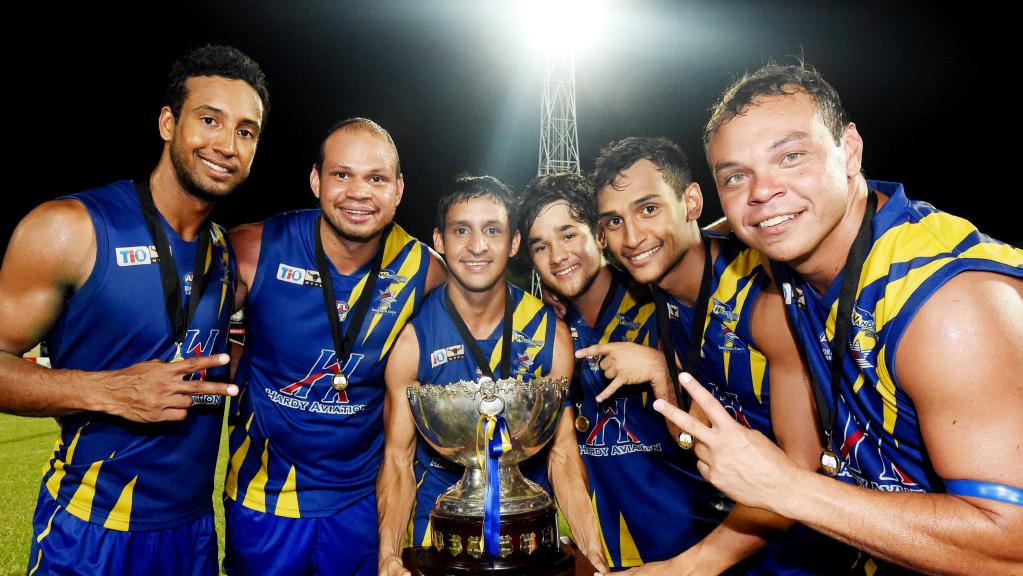By Will Hunter
 @Will_Hunter89
@Will_Hunter89
There have always been two massive constants throughout Thomas Motlop’s life – family and football.
And with a surname as recognisable as Motlop’s is, you could well imagine the two have been intrinsically intertwined.
Originally from Darwin, Motlop is part of a famous indigenous football family that has had occupied conspicuous presence in the AFL for the better part of the last two decades.
Motlop’s cousins, Shannon, Daniel and Steven, have between them played in excess of 300 AFL games, while his young brother, Marlon, also managed a handful of senior appearances in a fleeting career with Port Adelaide.
Thomas himself has played high-level football right across Australia, including stints at state-league clubs North Adelaide (SANFL), South Fremantle (WAFL) and Northern Territory Thunder (NEAFL) before signing on to play at St Kilda City this season.
Speaking on the eve of this weekend’s Sir Doug Nicholls Indigenous Round, the 29-year-old says he still maintains an incredibly close bond with all of his superstar relatives and will always be proud of his family’s sporting achievements.
“Yeah it was brilliant… Watching my cousins and my brother play AFL was a really great achievement and something my family values,” the first-year Saint said.
The Motlop family are a part of the Larrakia people, the traditional custodians of the land around the greater Darwin area.
Thomas also lays claim to Torres Strait Islander heritage, as his grandfather was born on Thursday Island, a small island in the Torres Strait north of the Cape York Peninsular.
Motlop describes the Larrakia as “very connected to the land and our extended families”, sentiments echoed in his fond recollections of his family’s influence in his life and career.
“My whole family has been a big influence on me, both in footy and away from footy,” Motlop said.
“What Shannon and Daniel have done for me in footy, they have done for me outside of footy as well, so I am really lucky to have extended family members that are really close to me.
“Travelling around when I was younger, they were established and helped me find my way as a young fella and gave me good values to look up to.”
These close familial ties also transcend into the football arena, with Motlop spending many seasons lining up alongside his cousins and siblings in various teams around the country. These are memories he cherishes, and will continue to do for as long as he is still able to play the game.
“Me and my cousin Aaron have played many years together up (in Darwin) since we started, and then with Shannon and Daniel when they came back from AFL,” Motlop said.
“And obviously I got to play with my brother Marlon at North Adelaide.
“So whenever we get that chance to, we are always keep to play football with each other and I suppose we will be doing that until our legs fall off!
Despite the Motlop clan’s somewhat nomadic status in football terms, it is at Wanders Football Club in their native Darwin with which their name has become most synonymous.
Thomas, one of many Motlops to represent the Eagles over the years, has played in two premierships at the NTFL club, and has particularly fond memories of the second of these triumphs – a moment he was lucky enough to share with several of his family members.
No fewer than six Motlops lined up for Wanderers in their upset victory over powerhouse St Mary’s in the 2015 decider in front of an 11,000-strong crowd at TIO Stadium. Thomas was also awarded the best on ground Chaney Medal for his sterling lockdown job on former St Kilda champion Stephen Milne.
This remains one of his proudest football moments.
“The way we live, football is a massive part of our lives, and to be involved in that football club, which is Wanderers in Darwin, it’s an extended family of ours,” Motlop said.
“To be able to contribute something to the club and to the community is something I’m proud of, and to share that great memory with so many of my brothers in that team was amazing.”
[caption id="attachment_14960" align="aligncenter" width="551"]
 Motlop Magic:
Motlop Magic: The Motlop boys - (from left) Thomas, Daniel, Aaron, Jerome, Marlon and Shannon- celebrate their 2015 NTFL premiership win with Wanderers.
Photo credit: NT News[/caption]
The indigenous people’s connection to the game of Aussie Rules is quite profound, and Motlop is grateful to be able to give something back the local community in the form of his dazzling on-field exploits. “Our currency is footy,” he remarked.
However, many non-indigenous Australians don’t fully understand how much the game means to Aboriginal and Torres Strait Islander communities, nor what it has given them, particularly from a societal and cultural point of view.
“What football has done has been a massive vehicle for Aboriginal people in Australia to help reconcile the (racial) differences and help sort through these issues,” Motlop explained.
“We’ve come a massive long way, and Australia needs a pat on the back for how far we’ve come and how far we’ve turned things around. Maybe there’s a little bit still to go, but the majority of it is on the right track.”
This season’s Sir Doug Nicholls Indigenous Round coincides with two historical milestones of great national significance, which the AFL are making concerted efforts to celebrate in addition to its traditional symbolic indigenous-themed initiatives this weekend.
This year is the 50th anniversary of the landmark 1967 Referendum, in which the Australian public voted overwhelmingly to amend the Constitution and remove two sections that discriminated against Aboriginal and Torres Strait Islander people.
Additionally, 2017 marks 25 years since the famous Mabo decision that recognised native title in Australia for the first time.
Motlop is a great fan of the Indigenous Round concept, which has been widely adopted by community Leagues such as the Southern Football Netball League, and applauds the AFL for its efforts to recognise the significance of football in indigenous communities and the contribution of indigenous players to the game.
“I love it. It’s great by the AFL to give Aboriginal people a round to celebrate our contribution because there’s a lot of parts of Australia where AFL is the main focus of young kids’ lives,” Motlop said.
“You go to the Tiwi islands, for example, and there are kids kicking the footy non-stop up there.
“Three Norm Smith medals have come from the Tiwi Islands [Maurice Rioli in 1982, Michael Long in 1993 and Cyril Rioli in 2015], which is remarkable for an area of that size.
“Indigenous people love AFL, so it’s good to see the AFL have love for the indigenous people as well.”
On Saturday, Motlop will run out for St Kilda City alongside indigenous teammates Carl Peterson (former Richmond and Hawthorn player) and Jack Williams (a cousin of Cyril Rioli), with the club arranging several initiatives at the Peanut Farm to mark Sir Doug Nicholls Indigenous Round.
A traditional indigenous smoking ceremony has been planned as part of the pre-match festivities, while the players will take to the field resplendent in St Kilda’s 2016 AFL Indigenous Round jumpers.
Later in the day, Motlop will head to the MCG with a former coach of his, ex-Bomber Dean Rioli, to watch his beloved Tigers take on Essendon in their tradition ‘Dreamtime’ clash.
The ceremonial aspects of these indigenous-themed games, Motlop says, helps promotes cultural harmony between indigenous and non-indigenous Australians by bringing about a greater awareness of traditional Aboriginal customs, in addition to a shared interest in the sport itself.
“You know, there’s still a lot of people in Australia who haven’t had an Aboriginal experience, experienced the (traditional indigenous) ceremonies, or even some people that may not have ever spoken to an Aboriginal person before,” Motlop said.
“So (through these Indigenous Round initiatives) we are just trying to create a wider understanding of our culture and our history.
“But at the end of the day, (the great thing is) we can all just enjoy a game of football together, regardless of race or colour, because it’s something all of Australia loves.”
 @Will_Hunter89
@Will_Hunter89 Motlop Magic: The Motlop boys - (from left) Thomas, Daniel, Aaron, Jerome, Marlon and Shannon- celebrate their 2015 NTFL premiership win with Wanderers.
Motlop Magic: The Motlop boys - (from left) Thomas, Daniel, Aaron, Jerome, Marlon and Shannon- celebrate their 2015 NTFL premiership win with Wanderers.